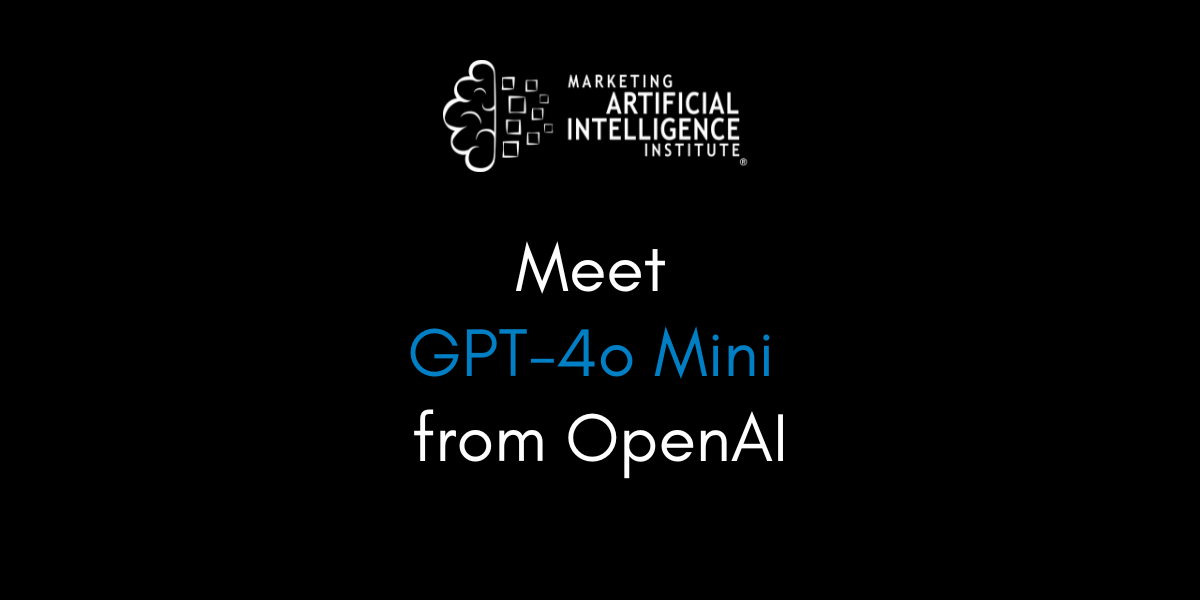OpenAI just released GPT-4o Mini, their most cost-efficient small model to date.
This new offering isn't just another incremental improvement—it's a game-changer.
That’s because it’s both more powerful than previous models. And much cheaper than them.
First, the part about being more powerful:
The model outperforms GPT-4 on certain tasks. It supports both text and vision inputs in its API, with plans to expand to audio and video. And it boasts a context window of 128,000 tokens.
Second, the part about being much cheaper:
GPT-4o Mini is priced at just 15 cents per million input tokens and 60 cents per million output tokens, which makes it an order of magnitude more affordable than previous frontier models and 60%+ cheaper than GPT-3.5 Turbo.
In other words, you now get way more intelligence for way less money—an overall industry trend that is reshaping business as we know it.
What does this mean for companies? For knowledge workers?
I got the scoop from Marketing AI Institute founder and CEO Paul Roetzer on Episode 106 of The Artificial Intelligence Show podcast.
What it means for businesses
Roetzer sees GPT-4o Mini as part of a broader trend: "Intelligence rises, costs fall." Models are consistently getting smarter and cost less to deploy, which accelerates the building of even more intelligent systems.
That could result, Roetzer says, in models that are 10-100X smarter than the technology we use today in just a few short years, leading to:
- Accelerated innovation: Startups building on these APIs can innovate faster and create more practical tools for various industries.
- Wider accessibility: As AI becomes cheaper, more businesses and individuals can access and benefit from the technology.
- Potential workforce disruption: The increasing capabilities of affordable AI could accelerate its impact on knowledge workers across industries.
- Exponential improvements: As intelligence becomes "good enough" and cheap enough, it could unlock exponential or runaway improvements in what's possible with AI.
Sam Altman, OpenAI's CEO, put the progress in stark terms in a post on X about GPT-4o Mini:
way back in 2022, the best model in the world was text-davinci-003.
— Sam Altman (@sama) July 18, 2024
it was much, much worse than this new model.
it cost 100x more.
Looking ahead
The release of GPT-4o Mini is more than just a new product launch—it's a glimpse into the future of AI.
Roetzer says that as these models continue to improve in capability while decreasing in cost, we're likely to see:
- More businesses experimenting with and adopting AI solutions
- An explosion of AI-powered applications across various devices and platforms
- Continued debate about the societal implications of widely accessible, powerful AI
For business leaders, the trendline is clear:
The AI revolution is accelerating, the barriers to entry are lower than ever, and the pace of AI advancement shows no sign of slowing down.
“That’s a weird dynamic to be planning for the future when intelligence seems to be everywhere and the cost of it is dramatically plummeting,” says Roetzer.
In other words, buckle up—the ride is just beginning.
Mike Kaput
As Chief Content Officer, Mike Kaput uses content marketing, marketing strategy, and marketing technology to grow and scale traffic, leads, and revenue for Marketing AI Institute. Mike is the co-author of Marketing Artificial Intelligence: AI, Marketing and the Future of Business (Matt Holt Books, 2022). See Mike's full bio.


